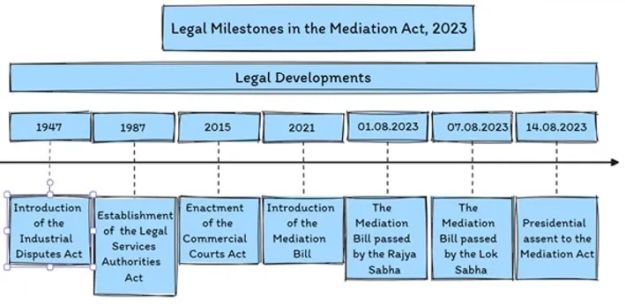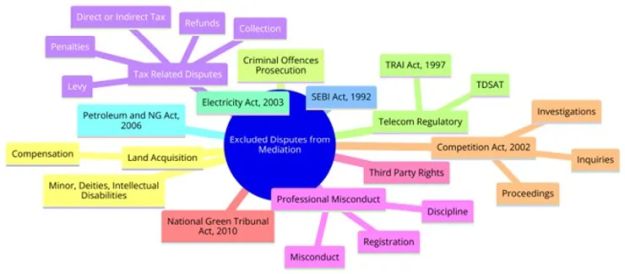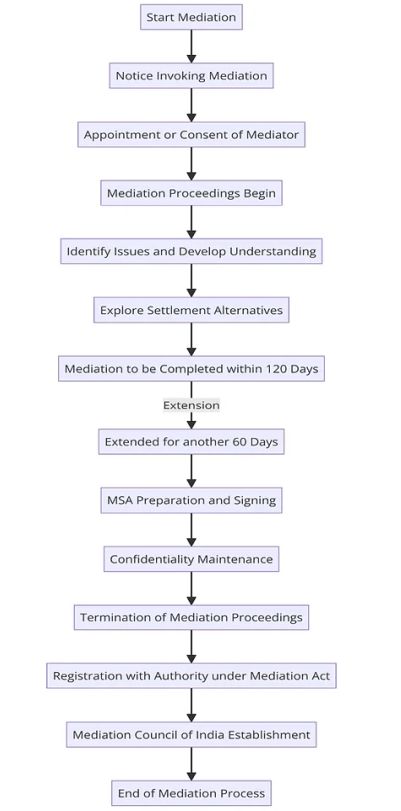- within Litigation and Mediation & Arbitration topic(s)
- in India
- in India
- within Corporate/Commercial Law topic(s)
- with readers working within the Law Firm industries
The Mediation Act, 2023 ('Act'), signifies a monumental shift in India's approach to dispute resolution, rooting back to its traditional Panchayat system and evolving through legal reforms post-British rule. The Act institutionalizes mediation, emphasizing cost-effective, timely resolution through online and community mediation, and the establishment of the Mediation Council of India. Applicable broadly within Indian jurisdiction, it aims to reduce the legal system's case backlog and speed up dispute resolution. Exclusions apply, ensuring that not all disputes are mediated. Definitions within the Act provide clarity on its mechanisms and processes, setting a structured framework for mediation proceedings, including confidentiality and the formal conclusion of mediation. The creation of a Mediation Fund underlines the commitment to promoting this alternative dispute resolution method. The Act not only modernizes conflict resolution in India, aligning with global practices but also revitalizes the mediation landscape to meet contemporary needs, making it a transformative piece of legislation in the field of dispute resolution.
Background
Long before the adoption of the formal British judicial system, the traditional Panchayat system prevailed in India, resolving community issues through a group of village elders. Disputes were also referred to respected businessmen, known as Mahajans, who would informally resolve conflicts among disputing parties.
The formal integration of mediation into the Indian legal system during the post-British era can be traced back to the Industrial Disputes Act, 1947, which prescribed detailed procedures for settling disputes outside the court. Subsequently, the enactment of the Legal Services Authorities Act, 1987, led to the establishment of Lok Adalats, further promoting the concept of mediation.
The enactment of the Commercial Courts Act, 20151, introducing mandatory pre-institutional mediation for certain types of commercial suits where no urgent relief is sought, marked another significant advancement in favour of commercial mediation. The Hon'ble Supreme Court has recently emphasized that this provision is substantial and must be adhered to before any remedy can be availed under the Act; failure to initiate pre-institutional mediation renders a commercial suit subject to dismissal2.
Mediation in Indian Law

S. 89(1) of the Code of Civil Procedure, 1908 ('CPC'), suggests that the Court may recommend disputing parties settle their dispute by various dispute resolution methods such as arbitration, conciliation, judicial settlement, or mediation. Therefore, it is well accepted and implemented by the Indian Courts and arbitration centres have been established all over India. However, now, the Central Government ('CG'), with the aim to promote and facilitate mediation for the resolution of disputes, introduced the new The Mediation Bill, 2021 ('Bill'), after being passed by the Rajya Sabha on 01.08.2023, and by the Lok Sabha on 07.08.2023, received the President assent on 14.08.2023, and has been enacted by the CG through Notification No. CG-DL-E-15092023-2487753.
Summary of the Act
The Act aims to promote and facilitate mediation, placing a special emphasis on institutional mediation. It offers a framework for cost-effective and timely dispute resolution through both online and community mediation. Additionally, the Act includes provisions for the enforcement of mediated settlement agreements and the establishment of the Mediation Council of India.
Applicability of The Act
S. 2 of the Act delineates its applicability to mediation processes. The Act applies to mediations conducted within India and extends to mediations where all parties either habitually reside, are incorporated, or have their place of business in India. Furthermore, it applies if the mediation agreement specifies that the dispute resolution will be conducted in accordance with the Act if one of the disputing parties is the CG, a state government, or any other governmental body, or if the dispute has been specifically notified by the CG or a state government for mediation under this Act.
Some Disputes That Are Excluded from Mediation

S. 6 of the Act, read with the first schedule, provides a list of disputes, or matters not fit for mediation, which includes:
- Disputes against minors, deities, and persons with intellectual disabilities.
- Disputes in relation to prosecution of criminal offences.
- Disputes relating to the levy, collection, penalties, direct or indirect tax, and refunds.
- Complaints or proceedings initiated before any statutory authority or body in relation to the registration, discipline, or misconduct of any practitioner, or other registered professionals.
- Disputes which affect the rights of a third party.
- Any proceeding over which the Tribunal constituted under the National Green Tribunal Act, 2010 has jurisdiction.
- Any investigation, inquiry or proceeding under the Competition Act, 2002, including proceedings before the Director General under the Act 2002. And Proceedings before the Telecom Regulatory Authority of India Act, 1997 or the Telecom Disputes Settlement and Appellate Tribunal established as per s. 14.
- Proceeding under the Electricity Act, 2003.
- Proceeding under the Petroleum and Natural Gas Regulatory Board Act, 2006.
- Proceeding under the Securities and Exchange Board of India Act, 1992.
- Land acquisition and determination of compensation under the land acquisition laws.
Key Definitions
- The term 'commercial dispute' means a dispute as ascribed in as per s. 2(1)(c) of the Commercial Court Act, 2015.
- The term 'community mediator' means a mediator for the purposes of conducting community mediation as per s. 43 of the Act under chapter X.
- The term 'institutional mediation' means mediation conducted under the supervision of a mediation service provider.
- The term 'mediation' includes a process, whether referred to by the expression's arbitration, pre-litigation mediation, online mediation, community mediation, conciliation, or expressions of similar import, where the parties, with the help of a third person ('mediator') , attempts to reach an amicable resolution of its dispute, who is neutral towards all parties but who does not have the authority to impose a settlement on the disputing parties.
- The term 'mediator' means a person who is appointed by the parties or by a mediation service provider to conduct mediation and includes a person who is registered as a mediator.
- Term 'mediation agreement' ('MA') as per s. 4(1) of the Act, shall be written by or between the parties and anyone claiming through them, to submit to mediation all or certain disputes which have arisen, or which may arise between the parties.
- The term 'mediated settlement agreement' ('MSA') means mediated settlement agreement as ascribed in s. 19(1).
- The term 'mediation service provider ('MSP') means mediation service provider referred to in s. 40(1) of the Act. It includes a body or an organisation, an authority constituted under the Legal Services Authorities Act, 1987, court-annexed mediation centre.
- The term 'online mediation' as per s. 30 of the Act, includes pre-litigation mediation that may be conducted at any stage of the mediation with written consent of the parties.
- The term 'pre-litigation mediation' as per s. 5 of the Act, is a process of undertaking mediation for the settlement of disputes prior to the filing of a suit or proceeding of civil or commercial nature. Parties must take steps to settle the disputes by pre-litigation mediation.
Mediation Proceedings

- Every mediation shall take place within the territorial jurisdiction of the court or tribunal of competent jurisdiction to decide the subject matter of the dispute.
- Mediation is deemed to commence from the day a party receives notice invoking mediation under the mediation agreement. In case there is no such agreement, from the date of appointment or consent of the mediator to be appointed.
- Mediators help resolve disputes by helping the parties identify the issue, develop a better understanding, clarify priorities, explore areas of settlement, generate alternatives, and emphasize the party's ultimate responsibility for making decisions regarding their boundaries.
- The mediation proceeding shall be completed within a period of 120 days from the date fixed for the first appearance of the mediator. Further, it may be extended for a further period of 60 days with mutual consent of the parties.
- An MSA is required to be in writing between some or all parties in the mediation setting some or all disputes between such parties authenticated by the mediator and signed by the parties voluntarily and registered with an authority constituted under the Act.
- The mediator, the MSP, the parties, and the participants in the mediation shall keep all matters relating to the mediation proceeding confidential. And no mediator, participant, expert, or adviser engaged for the purpose shall be permitted or compelled to disclose any information to any court or tribunal.
- The mediation proceeding shall be deemed to be terminated on the date of signing and authentication of the MSA or the date of the written declaration of the mediator, on the date of the communication by a party or parties in writing or on the expiry of time limit as per s. 18 of the Act.
- As per s. 31 of the Act, chapter VIII, provides for the establishment and incorporation of a Mediation Council of India by the CG to perform the duties and discharge the functions of the Act.
Miscellaneous
- There shall be a Mediation Fund to promote, facilitate, and encourage mediation under the Act, which shall be administered by the Council.
- The Council shall maintain proper accounts and other relevant records and prepare an annual statement of accounting including the balance sheet consultation with the Comptroller and Auditor General of India ('CAG'). The account shall be audited by the Comptroller and CAG.
- Any dispute including a commercial dispute, in which CG or state government or its agencies, public bodies, corporations and local bodies is a party, the settlement agreement shall be signed after obtaining the prior written consent of the competent authority of such government.
Conclusion
Until recently, India did not have a specific law solely dedicated to resolving disputes through mediation. Thus, the enactment of the Act, which mandates pre-litigation mediation, represents a significant step toward reducing the backlog of cases within the Indian legal system and facilitating the timely resolution of disputes. The Indian Institute of Arbitration and Mediation offers alternative dispute resolution ('ADR') services, including international and domestic commercial arbitration, mediation, and training programs in ADR. In summary, the Act is transformative in the field of dispute resolution. It not only modernizes the approach to resolving conflicts but also meets the evolving needs of individuals and businesses. Challenges to the MSA are limited to instances of fraud, corruption, impersonation, or if the subject matter of the disputes was not appropriate for mediation, as stipulated by s. 6 of the Act.
Footnotes
1. Section 12A of the Commercial Courts Act, 2015.
2. M/s Patil Automation Private Limited and Ors. v. Rakheja Engineers Private Ltd. SLP (C) No. 14697 of 2021.
3. Notification No. CG-DL-E-15092023-248775
The content of this article is intended to provide a general guide to the subject matter. Specialist advice should be sought about your specific circumstances.


